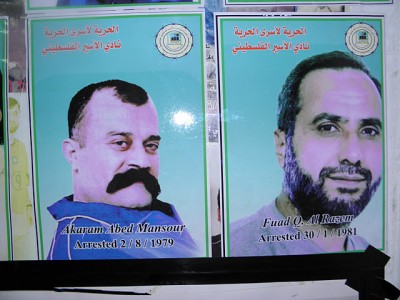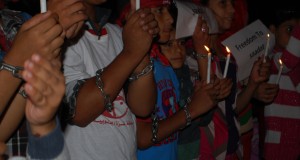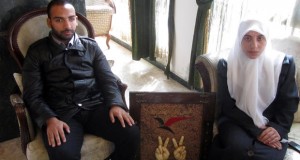by Alistair George
23 November 2011 | International Solidarity Movement, West Bank
Amer Ahmad Al-Qwasmah, 45, was released on 18 October 2011 as part of the prisoner exchange deal that saw 477 Palestinian prisoners (with 550 to be released at a further time, thought to be in December) in exchange for Gilad Shalit, the Israeli soldier captured by Hamas in 2006. Al-Qwasmah served 23 years in prison after being convicted of resistance within the PFLP (Popular Front for the Liberation of Palestine).
ISM: What were you convicted of?
Qwasmah: I belonged to a military group and I participated in an operation in 1987, several months before the intifada started, to kill an Israeli man in Jerusalem. It was because we were under occupation. We thought it was a civilian but after he had been killed the Israeli’s announced he was an air-force pilot. It was in the street in the Old City. He was shot….it was just chance [random]…there were five people in my group; two are still in prison – one still has eight months and the other has four more years.
ISM: Can you describe your arrest and what happened afterwards?
Qwasmah: I used to live in Jerusalem and came back toHebrononce a week to visit my parents. One day I was visiting my parents and they [Israeli security] came to the home and they arrested me. They demolished the house and they prevented my family from building a new building until the PA [Palestinian Authority] started operating here in 1997. This was common at the time.
They took me to Muscovia interrogation centre in Jerusalem. It is used as a detention place, for interrogation and as a prison. After 13 days my lawyer came to see me and I was naked…there were wounds and cuts all over the back [from being beaten]….they [the Israeli security forces] put me on a small chair, 3cm above the ground, and your hands and feet are handcuffed to the chair [in a very uncomfortable position] so that you can’t move. They also handcuff your hand to the ground for several hours [forcing you to crouch] and then they let you change position and sometimes an investigator comes and makes you stand on tip-toes.
Another kind of interrogation [technique] is that they send you to the freezer – this is unique toHebron. They put you in a very cold room and put you in a small chair and handcuff your hands to the chair and the chair to the ground to make sure you can’t move. They put a very bad-smelling cloth, worn by other prisoners, over your head and face. There are no holes to see or breathe through and they put me in this situation for 20 hours.
ISM: What happened after the period of interrogation?
Qwasmah: They sent me to Ramle jail, inIsrael. We decided to not go to court, we refused to sit in the court, so we were judged [in absentia] even though we weren’t there. My sentence was forever – 999, 999, 999 years! They intend to keep you for that long in the freezer. For civilians, a life sentence is for 25 years and they usually serve 15 or 15 years and then they’re released. I accepted this life because I carried a message – I was a fighter and in the resistance and I knew the consequences of resisting the occupation. I knew [when I joined the resistance] that I might be killed or spend my life in jail. But I always thought if I would be jailed, then one day I would be released.
ISM: What were the conditions like after you were sentenced?
Qwasmah: Prison is a lot of suffering, the suffering has got worse after 2003; when Ariel Sharon was prime minister he wanted to punish prisoners more and more. Each year was more complicated and there was more suffering – they prevented relatives visiting, they made us pay fines (like 500 shekels). They count prisoners three times a day, in the morning, around noon and the evening – if you are 2 minutes late for counting, then maybe they wouldn’t let your parents visit you, or you have to pay a fine, or they sent you to a tiny isolation cell. It is common for them to ignore you when you need medical treatment. They also strip search parents and family coming to visit you – imagine what that is like for a woman. It is not humanitarian behaviour [it is humiliating] when they ask a woman to remove all her clothes for security reasons and they make them wait for several hours until they bring you to see them.
For around 10-12 years they didn’t let my brothers or sisters visit me due to ‘security concerns’. They didn’t let my mother visit me for 1 1/2 years – they tried to say we weren’t related but she is my mother! That happened with lots of prisoners. The Shabak [Israeli security] use it as part of their psychological torture and the interrogation; if they say ‘no’, the Red Cross can’t do anything.
They [the prison authorities] physically tortured me. They used to put us in a room with around 7cm of water on the floor, so we couldn’t stay comfortable in the room. Sometimes they made us stay a day and sometimes a few hours. They killed prisoners [by torture] – Mustafa Al-Qaawi was a doctor who went to study in Romania, when he got back to Palestine he was arrested, interrogated and killed – they put him on the roof of the military building in Hebron and the weather was cold, it was snowing at that time. He died from the cold.
One prisoner was arrested in 1996 and he has been in isolation since that time. Another prisoner was in isolation since 1995 and was even in isolation during hunger strike. One prisoner from Gaza was kept in isolation for 20 years and now he can’t communicate with anyone, not even his family. Isolation is a slow-death. They isolated me for eight months – with one other person in a small room. They said that I tried to smuggle mobile phones into prison – I didn’t do it. There was no heating. I didn’t see my parents for 8 months.
Access to news did not used to exist in jail, like many things – like books. When I was in jail I participated in different hunger strikes for different demands. One of these demands was for the media – for newspapers and for books. Only recently can you get TV in prison but now the channels are limited, there are mainly Israeli or Russian channels allowed because Israel controls the satellite… the newspapers are Israeli and in Hebrew and you have to subscribe.
The Oslo agreement [signed in 1993] affected the daily life in prison. The Prisoners Committee was very strong [before the agreement] – there were schools and universities inside the jail. But after the Oslo agreement, some of the prisoners started acting as if they were released from prison already. Israel brought us papers and told us to sign these papers and they would release us – to say that we support the Oslo agreement but we [the PFLP] were against this agreement so we refused to sign. Four or five times they demanded we sign this paper and we kept refusing. Some Fatah prisoners signed and thought they would be released and starting cancelling the political meetings and they even burned some political booklets because they said ‘we are released!’ but the shock came to them when Israel refused. This affected the situation of the prisoners. The people who were released were mainly short-term prisoners or they were criminals – in prison for drugs. Not many political prisoners – only the short-termers.
In prison we used to play sport, especially in the morning – it used to be one hour a day but after some hunger strikes it was changed to four hours a day. We also used to have political meetings and discussions. We had official political meetings around twice a week and we often discussed some books or some poets. The Israelis could listen but they don’t care. In the beginning [of my jail term] it was forbidden for the prisoners to read books, or newspapers, or watch TV and have meetings – but the history of resistance, the hunger strikes were a strategic weapon that we used to resist and to survive in Israeli jail. Even pens and paper used to be forbidden– prisoners would write on toilet paper.
ISM: How did you deal with this treatment?
Qwasmah: I am a representative of the resistance and even though there was a lot of torture I coped. I was strong and showed them the power of the resistance – maybe that’s why them kept torturing me more and more to break me and my psychological health. I still suffer from health problems in my stomach and my back – just today I was in the hospital for my colon problem and problems with my digestion. This happened because of the interrogation.
In prison they use Acamol for everything; headaches, stomach problems – anything. The prisoners used to joke about it and call it the ‘magic medicine’. My interrogation and torture was for around 15 days but because it was very intense it felt like two years.
ISM: What was it like to hear that you would be released?
Qwasmah: I didn’t care that my name was on the list, I could have checked but I didn’t. I found out just six days before I was released. These six days were difficult – for the last 24 years I had always been welcoming and then saying goodbye to other people. Many people cry when they have to leave jail. Before, it was others leaving us – now I had to leave the others. There are prisoners who have been in jail a very long time but they have not been released – so I was sad and unhappy [for them]. I was upset and it made those six days so hard – harder even than a hunger strike or interrogation – because I left people who I had lived with for a long time. The Israelis allowed the prisoners to go and say goodbye to all the prisoners but I couldn’t say goodbye to anyone, it was too hard.
ISM: What is your opinion of the prisoner exchange deal?
Qwasmah: Your country, the USA, and western countries don’t care about Palestinian prisoners. All they care about is the Shalit case – which for them was a political and humanitarian case but they don’t care about the Palestinians…even people who care about humanitarian issues. The Shalit deal is very good but I feel sad for the remaining prisoners. I want to askEurope; what about the Palestinian prisoners?
ISM: What are your plans now that you’ve been released?
Qwasmah: First of all I have to get used to being free, to look around myself and spend time with my family and then I will think about work. Then I will look for a wife and get married. I feel like there are a lot of obstacles when I got out as I moved from one life to another life and I have to take some time to adapt.
ISM: Do you regret what you did or feel a sense of guilt?
Qwasmah: Before, after and during prison I was proud of what I did, I spent my youth in prison…we are offering our lives for the resistance and we can offer more and more forPalestine. As Palestinians, our lives are political but I am not going to focus on politics until I take some time and adapt to social life and to my family – I have brothers, sisters, aunts that I don’t know. I can think about politics later. All forms of available resistance are needed to resistIsrael.
Alistair George is a volunteer with International Solidarity Movement (name has been changed).
 International Solidarity Movement Nonviolence. Justice. Freedom.
International Solidarity Movement Nonviolence. Justice. Freedom.


